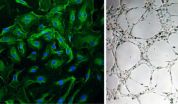(Press-News.org) CHAPEL HILL, N.C. – Circulating through the bloodstream of every human being is a rare and powerful type of cell, one that can actually create new blood vessels to bypass blockages that cause heart attacks and peripheral artery disease. Though everyone has these cells – called endothelial progenitor cells – they are often dysfunctional in people prone to vascular disease.
Now researchers at the University of North Carolina at Chapel Hill have discovered that a molecule – called Wnt1 – can improve the function of endothelial progenitor cells, increasing the blood flow to organs that previously had been cut off from the circulation. The finding could enhance clinical trials already testing these powerful cells in patients hospitalized with cardiac arrest.
"The premise of these trials is that these cells will supply the ischemic organ with new blood vessels and allow the damaged organ to function better," said senior study author Arjun Deb, MD, assistant professor of medicine in the UNC School of Medicine. "But because you are isolating these cells from the patients themselves, you know that the cells are dysfunctional -- so the approach is almost flawed from the very beginning. We want to see how we can improve the function of these cells so they can do their job better."
The study, published online Feb. 14, 2011, in the FASEB (Federation of American Societies for Experimental Biology) Journal, is the first to show that the Wnt1 protein, one of a family of 19 such molecules, can stimulate blood vessel formation.
A number of studies in the past few years have suggested that genes that play an important role during early development and get "turned off" during adulthood may also get "turned on" or expressed again in response to injury, such as heart attack.
Deb, who studies the Wnt family of developmental genes, looked to see if any of its members follow this same pattern. He found that one gene in particular, Wnt1, was expressed during development of blood vessels, shut off during adulthood and then re-expressed in angiosarcoma, a cancer of endothelial cells.
Deb wanted to see what would happen if he put the Wnt1 protein on human endothelial progenitor cells. He found that treating these special cells with Wnt1 not only greatly increased their function but also their number. Next, Deb and his colleagues investigated what effect the protein would have on a mouse model of peripheral artery disease, an illness in humans caused by decreased blood flow to the extremities. They found that treating these animals with a single injection of the Wnt1 protein resulted in almost three fold increase in blood flow in the affected areas.
"We found that Wnt1 is a novel proangiogenic molecule, something that has never been shown before," said Deb. "It gives us hope that injecting the Wnt1 protein -- or molecules that stimulate the Wnt1 signaling pathway -- into ischemic tissues in humans could improve blood flow and assert a therapeutic effect."
Approximately 1 in 4 deaths in adults in the US are secondary to heart disease and as many as 15 percent of Americans age 65 and older have peripheral artery disease. In the future, Deb plans to use his findings to identify such small molecules or drug candidates that could reverse the endothelial progenitor cell dysfunction observed in so many patients with vascular disease.
INFORMATION:
The research was funded by the National Institutes of Health and Ellison Medical Foundation. Study co-authors were Costin M. Gherghe, MD, PhD, postdoctoral fellow in Deb's lab; Jinzhu Duan, PhD, postdoctoral fellow in Deb's lab; Jucheng Gong, lab manager in Deb's lab; Mauricio Rojas, MD, MPH, director of mouse cardiovascular models core lab; Nancy Klauber-Demore, MD, associate professor of surgery; and Mark Majesky, PhD, Professor of Pediatrics, University of Washington, Seattle.
Scientists identify molecule that can increase blood flow in vascular disease
2011-03-11
ELSE PRESS RELEASES FROM THIS DATE:
Referral to high-volume hospitals for operations fails to improve outcomes statewide
2011-03-11
Referring patients to hospitals that have the largest volume of surgical procedures does not necessarily lead to improved outcomes for the overall population, according to the results of a new study in the February issue of the Journal of the American College of Surgeons.
The findings of studies that suggest the higher the volume of specialty surgical procedures performed at any given hospital, the better that hospital's outcomes will be, has resulted in calls for volume-based referrals. Most notably leading that call has been the Leapfrog Group's Evidence-Based Hospital ...
Syracuse University research team shapes cell behavior research
2011-03-11
A team led by James Henderson, assistant professor of biomedical and chemical engineering in Syracuse University's L.C. Smith College of Engineering and Computer Science (LCS) and researcher in the Syracuse Biomaterials Institute, has used shape memory polymers to provide greater insight into how cells sense and respond to their physical environment.
Most cell biomechanics research has examined cell behavior on unchanging, flat surfaces. "Living cells are remarkably complex, dynamic and versatile systems, but the material substrates currently used to culture them are ...
A glove on your hand can change your mind
2011-03-11
Unconsciously, right-handers associate good with the right side of space and bad with the left. But this association can be rapidly changed, according to a study published online March 9, 2011 in Psychological Science, by Daniel Casasanto (Max Planck Institute for Psycholinguistics) and Evangelia Chrysikou (University of Pennsylvania). Even a few minutes of using the left hand more fluently than the right can reverse right-handers' judgments of good and bad, making them think that the left is the 'right side' of space. Conceptions of good and bad are rooted in people's ...
Lover's lane for birds found in Arctic
2011-03-11
NEW YORK (March 9, 2011) – A new study by the Wildlife Conservation Society reveals the critical importance of western Arctic Alaska's Teshekpuk Lake region to tens of thousands of birds that breed in the area during the brief, but productive arctic summers, and makes clearer the case for permanent protection of the area.
Results of the four-year study—the first to look at the full suite of bird species from around the world that descend on the Teshekpuk Lake region—showed that the region contains some of the highest nesting bird densities and nest productivity across ...
Alcohol has stronger impact on gastric bypass patients, study finds
2011-03-11
Patients who have had a gastric bypass operation take longer to process alcohol, potentially leading some of them to overindulge when drinking, according to the results of a new study in the February issue of the Journal of the American College of Surgeons.
Previous studies have shown that gastric bypass patients often find it difficult adjusting to physical and psychological changes after the procedure. An increased risk of depression, alcoholism, and other substance abuse issues for this patient population led researchers to take a more in-depth look at how these patients ...
New model shows importance of feet, toes in body balance
2011-03-11
COLUMBUS, Ohio – Researchers are using a new model to learn more about how toe strength can determine how far people can lean while keeping their balance.
The results could help in building robotic body parts that will closely imitate human movement, and might lead to a new generation of advanced prosthetics.
Hooshang Hemami, professor of electrical and computer engineering at Ohio State University built a complex computational model of the human foot to look at the role of the feet and toes in determining the body's movement and balance.
Many studies concerning ...
Erectile dysfunction drug improves exercise tolerance in young people with congenital heart disease
2011-03-11
Sildenafil, a drug used to treat erectile dysfunction and pulmonary hypertension, has another possible use—helping children and young adults with congenital heart disease to better tolerate exercise. Sildenafil significantly improved measures of exercise performance during stress testing in patients with single-ventricle heart disease, according to researchers from The Children's Hospital of Philadelphia.
This study was published online on March 7 in the journal Circulation. It is the first randomized, double-blind, placebo-controlled, crossover trial to evaluate the ...
Study shows exercise can curb pot use, cravings
2011-03-11
Vanderbilt researchers are studying heavy users of marijuana to help understand what exercise does for the brain, contributing to a field of research that uses exercise as a modality for prevention and treatment.
Participants saw a significant decrease in their cravings and daily use after just a few sessions of running on the treadmill, according to a Vanderbilt study published today in the journal PLoS ONE. It is the first study to demonstrate that exercise can reduce cannabis use in persons who don't want to stop.
Twelve study participants — eight female and four ...
New technology would dramatically extend battery life for mobile devices
2011-03-11
CHAMPAIGN, Ill. — Technophiles who have been dreaming of mobile devices that run longer on lighter, slimmer batteries may soon find their wish has been granted.
University of Illinois engineers have developed a form of ultra-low-power digital memory that is faster and uses 100 times less energy than similar available memory. The technology could give future portable devices much longer battery life between charges.
Led by electrical and computer engineering professor Eric Pop, the team will publish its results in an upcoming issue of Science magazine and online in the ...
A small quantum leap
2011-03-11
Northwestern University researchers have developed a new switching device that takes quantum communication to a new level. The device is a practical step toward creating a network that takes advantage of the mysterious and powerful world of quantum mechanics.
The researchers can route quantum bits, or entangled particles of light, at very high speeds along a shared network of fiber-optic cable without losing the entanglement information embedded in the quantum bits. The switch could be used toward achieving two goals of the information technology world: a quantum Internet, ...



